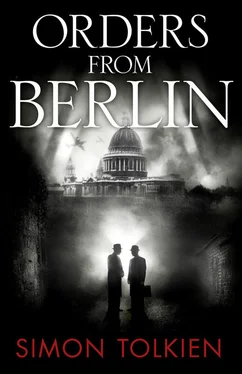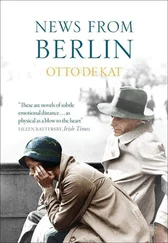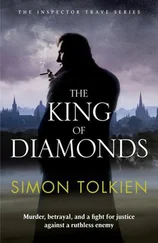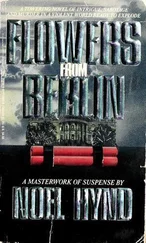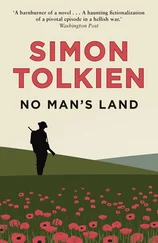Simon Tolkien - Orders from Berlin
Здесь есть возможность читать онлайн «Simon Tolkien - Orders from Berlin» — ознакомительный отрывок электронной книги совершенно бесплатно, а после прочтения отрывка купить полную версию. В некоторых случаях можно слушать аудио, скачать через торрент в формате fb2 и присутствует краткое содержание. Жанр: Полицейский детектив, на английском языке. Описание произведения, (предисловие) а так же отзывы посетителей доступны на портале библиотеки ЛибКат.
- Название:Orders from Berlin
- Автор:
- Жанр:
- Год:неизвестен
- ISBN:нет данных
- Рейтинг книги:4 / 5. Голосов: 1
-
Избранное:Добавить в избранное
- Отзывы:
-
Ваша оценка:
- 80
- 1
- 2
- 3
- 4
- 5
Orders from Berlin: краткое содержание, описание и аннотация
Предлагаем к чтению аннотацию, описание, краткое содержание или предисловие (зависит от того, что написал сам автор книги «Orders from Berlin»). Если вы не нашли необходимую информацию о книге — напишите в комментариях, мы постараемся отыскать её.
Orders from Berlin — читать онлайн ознакомительный отрывок
Ниже представлен текст книги, разбитый по страницам. Система сохранения места последней прочитанной страницы, позволяет с удобством читать онлайн бесплатно книгу «Orders from Berlin», без необходимости каждый раз заново искать на чём Вы остановились. Поставьте закладку, и сможете в любой момент перейти на страницу, на которой закончили чтение.
Интервал:
Закладка:
At three o’clock Heydrich put on his cap, straightened his uniform, and walked out into Prinz-Albrecht-Strasse. He preferred to walk; it was a beautiful day, and the Reich Chancellery was only two streets away. His two SS bodyguards fell into step behind him, but he paid them no attention. Heydrich had a deep-seated faith in his own inviolability that was to continue right up until the moment of his assassination in an unescorted, open-topped Mercedes staff car in Prague two years later.
He turned left into Wilhelmstrasse and walked past the long steely-grey marble facade of the massive Air Ministry building, thinking of Goering and the continuing inability of the Luftwaffe to win the air war over London. Heydrich had an acute sense of the shifting movements of power in Hitler’s court, and he had no doubt that Goering’s star was on the wane. If Seaforth’s plan succeeded, Heydrich had no doubt that he would eclipse not just Goering but all the other party bosses. The thought made him giddy and he had to steady himself for a moment before he passed through the outer gates of the Chancellery and entered the Ehrenhof, the court of honour, leaving his bodyguards behind. The Fuhrer had a way of seeing into people’s minds, and Heydrich knew that he needed to have all his wits about him during the coming encounter.
The great marble walls, lined with square and rectangular windows, reared up on all sides, defining in strict shape the rectangle of blue sky above. Not a curve or a flourish had been allowed to interrupt the stark symmetry of the architecture. The courtyard was not empty — helmeted, black-uniformed SS guards stood at exactly spaced intervals around the sides. But they were immobile, trained to rigid stillness, and the silence, broken only by the sound of Heydrich’s boots crossing the marble floor, added to the impression of overwhelming power that the construction was intended to convey. Heydrich felt it as a unique silence — not an absence of noise, but a presence in its own right, bearing down on him from all sides.
He climbed the steps leading to the entrance and went inside, passing through a dark, windowless hall inlaid with red mosaics and on into the long gallery, the famous centrepiece of the building, lit by a parade of high windows looking out over the Voss-Strasse. There was no furniture anywhere, not even a trace of carpet to relieve the severity of the design. Slippery marble floors were just the right surface for slippery visiting diplomats, according to Hitler.
The huge bronze doors at the end of the gallery beckoned and threatened, but Hitler’s office was halfway down on the right, with the intertwined AH initials of his name monogrammed above the doorway, where two steel-helmeted SS soldiers from his personal protection unit stood guard with their guns at the ready.
Heydrich was known and expected. The doors opened and he stepped inside. The office was vast, far larger and grander than any office he’d ever seen. Heavy tapestries and huge baroque paintings adorned the blood-red marble walls, and Hitler’s desk was placed intentionally at the far end, so that visitors would have a final journey to make across the thick carpet towards the dictator’s presence. It was a room designed to intimidate, but that was not Hitler’s intention today. He wasn’t sitting at his desk; instead he was standing in front of a large marble-topped table positioned under one of the tall windows looking out over the Chancellery gardens, examining an architectural model of a building that Heydrich did not recognize. He was bareheaded, wearing a black tie and a brown military jacket with a swastika armband.
‘Do you know what this is, Reinhard?’ asked Hitler, looking up at his visitor and acknowledging his raised-arm salute with a nod of his head. Heydrich was encouraged by the Fuhrer’s use of his first name. Hitler was notoriously unpredictable, and Heydrich needed him to be in a receptive mood.
‘No. Please tell me,’ said Heydrich, pretending to be interested. He knew nothing about architecture but was aware that it was a subject dear to the Fuhrer’s heart.
‘It is a design for my mausoleum. It will be built in Munich across from party headquarters. You can see it is modelled on the Pantheon in Rome. See, here is the rotunda and in the roof directly above the sarcophagus, you have the oculus,’ said Hitler, pointing.
‘What’s that?’ asked Heydrich. It was a word he’d never heard before.
‘The round opening, the eye. And just like in Rome, there is no glass. The sunlight and the rain, even the snow in winter, fall onto the tomb, connecting it to the elements. It is perfect.’
Hitler clasped his hands together, a characteristic gesture when he was pleased. But Heydrich was horrified. There was so much to do, yet here was the Fuhrer planning his own funeral.
‘Don’t worry, Reinhard,’ said Hitler, laughing as he sensed Heydrich’s discomfort. ‘I am not dying just yet. But nor do I feel that I will live to be an old man, which is why I am in a hurry. Perhaps when we have accomplished all that we need to do in the world, then there will be time for me to return to architecture. I would like to build, but first we have to destroy,’ he said wistfully. There was a faraway look in his eye.
‘Thank you for seeing me at such short notice,’ said Heydrich after a moment, when Hitler showed no sign of abandoning his examination of the mausoleum. ‘I wanted to talk to you about the assassination plan we discussed before. I have heard from our agent in England this morning …’
‘Yes,’ said Hitler, shaking his head as if dismissing his dreams. ‘I am eager to hear what he has to say. Come, let us sit down and you can tell me all about it.’
Hitler walked over to the fireplace and sat in an armchair. Heydrich sat at right angles to the Fuhrer on an enormous sofa the size of a small lifeboat. He took off his SS cap and held it in his hands. A valet came in and served tea and cakes. Hitler gestured with his hand to the plate, and when Heydrich declined, he ate one of them himself with obvious enjoyment.
Heydrich glanced up at the portrait of Bismarck hanging over the fireplace, rehearsing what he had to say while he waited for the valet to leave the room. He knew that the picture was there to underline Hitler’s legitimacy as leader of the Reich, succeeding the man who had achieved the unification of Germany seventy years before. But Bismarck had wanted nothing more, trying to keep peace with the Russian bear through a complex system of alliances, whereas the Fuhrer was itching to send his armies east into the steppes. Only the war with England was stopping him. Hitler rightly wanted to avoid the Kaiser’s mistake of fighting on two fronts, and Heydrich believed that he had the means to ensure that that would not be necessary.
‘So, tell me — how does Agent D intend to rid us of fat Mr Churchill?’ Hitler asked. His mocking tone belied his obvious interest in the answer to his question. He sat rigid in his chair, looking hard at Heydrich.
‘He suggests that we provide him with sufficiently valuable intelligence to ensure he gets another summons from Churchill, and then, once he’s inside the room, he proposes to shoot Churchill with a handgun from close range and then turn the gun on his superior, a man called Alec Thorn,’ said Heydrich, speaking in a matter-of-fact tone of voice. ‘This should take no more than a few seconds, and then when people hear the gunshots and rush into the room, D will say that Thorn shot Churchill and that he killed Thorn while he was wrestling the gun away from him. If all goes well, the end result should be that Churchill will be dead and our agent will get the credit for having tried to save him. And then with any luck, he will replace Thorn as deputy head of MI6.’
Читать дальшеИнтервал:
Закладка:
Похожие книги на «Orders from Berlin»
Представляем Вашему вниманию похожие книги на «Orders from Berlin» списком для выбора. Мы отобрали схожую по названию и смыслу литературу в надежде предоставить читателям больше вариантов отыскать новые, интересные, ещё непрочитанные произведения.
Обсуждение, отзывы о книге «Orders from Berlin» и просто собственные мнения читателей. Оставьте ваши комментарии, напишите, что Вы думаете о произведении, его смысле или главных героях. Укажите что конкретно понравилось, а что нет, и почему Вы так считаете.
